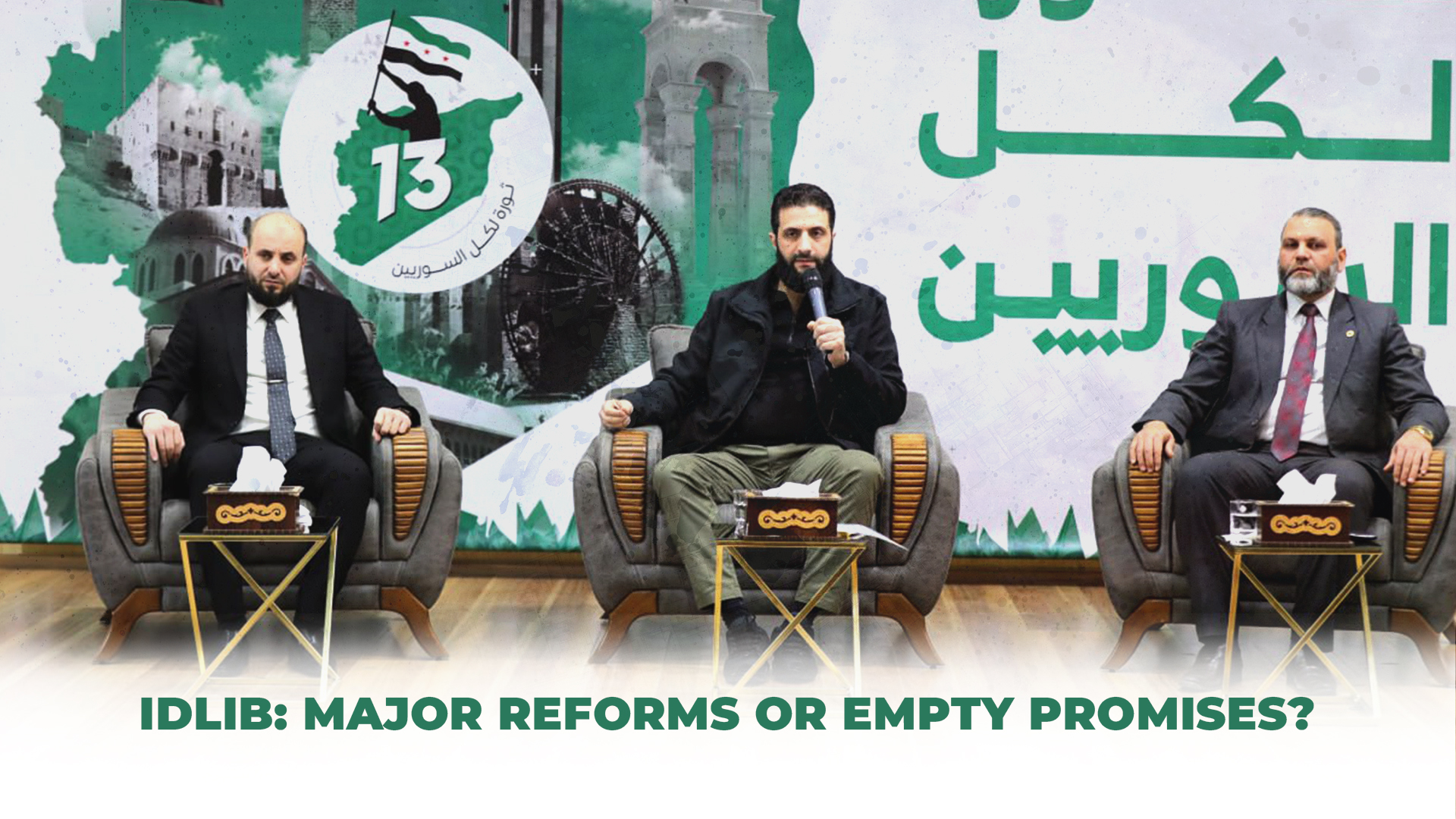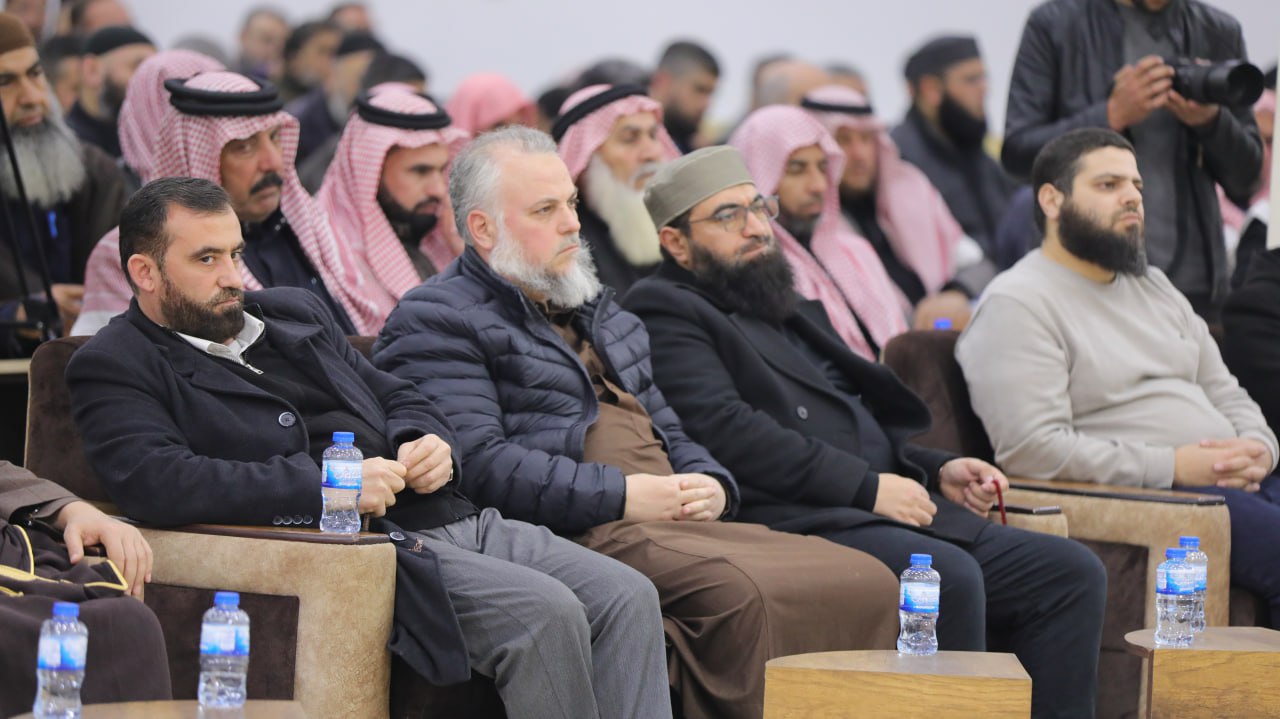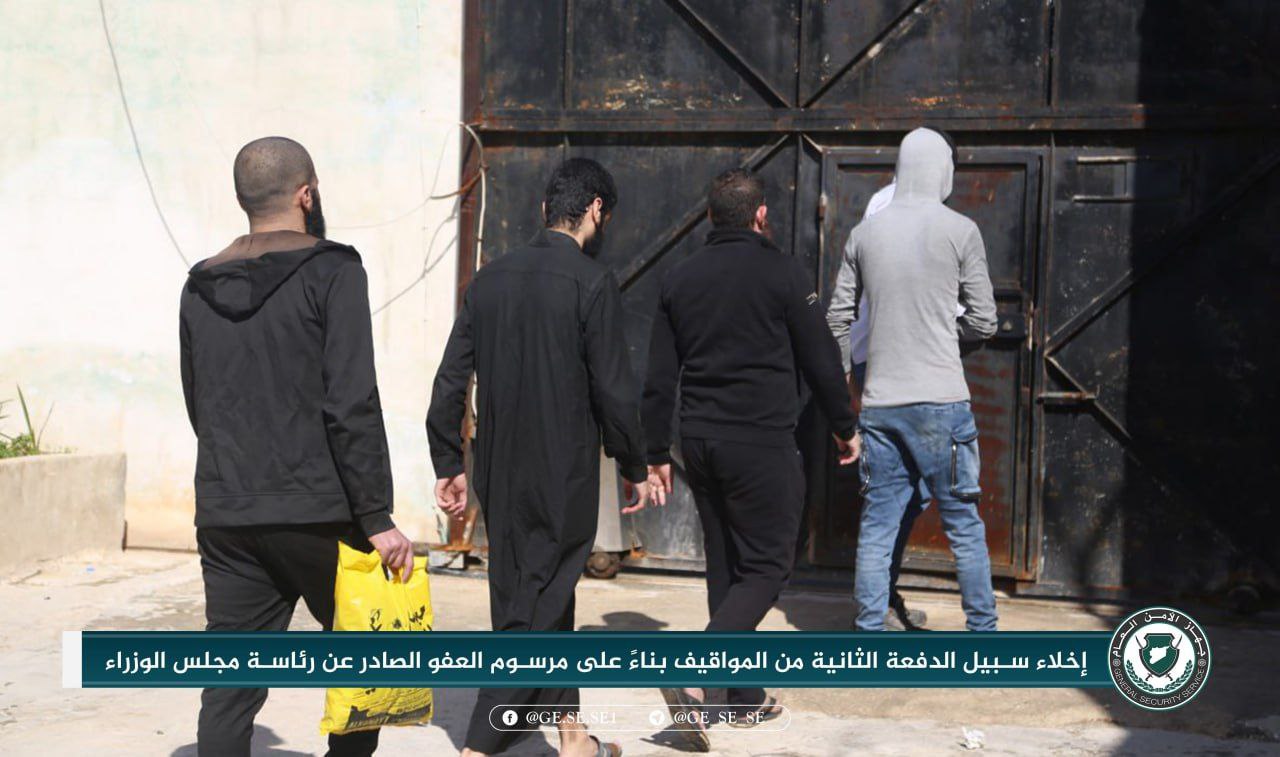
Between July 2023 and January 2024, a series of arrests, carried out by the General Security Service (GSS), swept through the liberated areas of northwestern Syria. The targets included numerous high-ranking officers within Hayah Tahrir al-Sham (HTS). Allegations surfaced suggesting their “collaboration with external entities,” casting a shadow of suspicion over their loyalty and integrity.
The scale of these arrests became increasingly alarming, prompting intervention from HTS leader, Abu Muhammad al-Jolani. Upon investigation, it became evident that some of the accused had confessed to the allegations under duress and torture. Consequently, the cases were reexamined, leading to the release of most of those arrested. However, the aftermath of these events ignited public demonstrations, with citizens demanding accountability, institutional reforms, and the release of unjustly detained individuals.
Anger and frustration among the populace galvanized calls for fairness and transparency in the handling of legal matters, asserting that the current situation deviated from the principles the revolution initially stood for. Pressure mounted amid calls by some demonstrators for the ousting of Jolani, who holds military control in the region. A number of demonstrators rejected HTS’s policies and its monopolization of decision-making. In response, the leadership engaged with various stakeholders, including tribal leaders, community members, and innocent prisoners who were wrongfully detained.
Redressing Wrongs and Restoring Rights
At the beginning of March, Abdul Rahim Atoun, the president of the Supreme Council for Fatwa in HTS, released a statement addressing the discontent and demands of the people. Atoun revealed several initiatives aimed at addressing the grievances of the people, the leadership’s efforts included the formation of a judicial committee, the release of individuals awaiting charges, and the implementation of a general amnesty before Ramadan. It was during preliminary meetings that plans were set in motion to revise laws and government fees, with advocacy for dialogue between the government and demonstrators to address their demands.

The SSG Minister of the Interior, Mohammad Abdul Rahman, recently disclosed that at least 420 prisoners were released under the amnesty decree. He assured that more individuals covered by the amnesty would be released in due course. Following their release from custody, over 150 former prisoners involved in the initial espionage and treason case issued a collective statement, expressing gratitude for their return to their families and community after enduring months of suffering.
Their statement declared, “We emphasize our absolute confidence in the finished investigation and compensation for those affected and our full commitment to its provisions.” Furthermore, they stressed the importance of internal unity and solidarity to thwart any attempts by adversaries to infiltrate their ranks. “We categorically reject any form of climbing on our wounds and trading in our pain,” it proclaimed, vehemently rejecting any exploitation of their ordeal for personal gain, settling of scores, or the advancement of political agendas.
It was amidst this backdrop of anger, frustration, and upheaval that a gathering of over 500 people took place, including activists, demonstrators, elites, academics, notables, unions, military and civilian personnel, and community committees representing every region in liberated northwestern Syria. The symposium convened under the banner “The Revolution Belongs to all Syrians,” where all components of the revolution were invited to participate in addressing the demands of the people, addressing grievances, and reforming institutions.
Adressing Public Outcry
SSG Prime Minister Engineer Mohamed Al-Bashir, Dr. Mustafa Musa, Chairman of the General Shura Council, and Abu Muhammad al-Jolani were all present to address the concerns, questions, and recommendations of those in attendance. Among those invited were those critical of the current leadership such as former SSG minister Dr. Bassam Sahyouni, Dr. Ayman Haroush, a prominent Islamic scholar and former critic of HTS, and Abdur Razaq al-Madhi, Islamic scholar and prominent leader in the demonstration movement, who was absent.
Jolani was among the first to acknowledge the need for change. “Mistakes occurred,” he said, “so we went out to the people and acknowledged it, retracted it, and formed committees to correct the situation,” emphasizing the importance of acknowledging past mistakes and the negligence within the authority. He also highlighted a shift in policy towards correction, change, consultation, and reformation as key priorities moving forward. According to him, “We have many decisions that support and develop this liberated area, and we are trying to make the ordeal that befell us a great blessing in which we pay attention and listen to our community and brothers.”

The significance of listening to the community’s concerns and working collaboratively to implement effective solutions was a main theme of his speech as he sought to reassure the audience that despite past challenges, the leadership remains committed to improving governance and serving the needs of the people.
One of the main issues raised in the demonstrations was Jolani’s resignation and removal from leadership. Clarifying there exists no dispute over authority, “You can do this in your council (here and now), and I say it, and I mean what I say. Agree on a person to whom all of you will listen – if most, 60 to 70 percent, of you are in agreement, I am with you and I will be the first person to surrender everything I have, and let him take the responsibility (of leadership).”
“Provided,” he continued, “that he adheres to work within the regulations that the liberated areas follow. If you want that, you here represent all segments of society, and whoever is absent (from this gathering) bears responsibility for his own absence.” Dr. Sahyouni was critical of the move, posting on his social media accounts, “When Abu Muhammad al-Jolani asked the people to choose a replacement for him in the same session – this is not valid. The matter requires consultation, arrangements, and coordination, and it cannot be done in this way, which is almost impossible. ‘Either you choose an alternative now at this moment or I stay in my place!’”

General Shura Council Chairman, Dr. Musa expressed the importance of unity and cohesion among the opposition. He stated, “We were one hand and one body and we will remain so.” He highlighted the significance of recent demonstrations as a testament to the people’s dedication to the revolutionary cause and their desire for progress and detailed the establishment of committees by the General Shura Council to address grievances and proposals from various segments of society, ensuring a comprehensive approach to problem-solving.
“Every day, the committees receive approximately seventy clients, most of whom complain about security procedures, the litigation mechanism, the Ministry of Justice, the Interior, the Information Branch, Endowments, oil derivatives, state property, and local administration,” said Musa.
These committees, Musa explained, have been actively engaging with the community, receiving and resolving complaints on a wide range of issues. He focused on the importance of preserving institutions and resisting chaos, echoing the sentiments of the people he encountered, who emphasized the need to remain steadfast in the face of adversity.
Among those in agreement was Dr. Haroush, who delivered a speech highlighting the challenges facing the opposition in northwestern Syria. He questioned whether the fragmented state of affairs before the establishment of the government could serve as a viable alternative to the Assad regime. Dr. Haroush cautioned against assuming that any change in leadership would automatically lead to improvement, urging a cautious approach and emphasizing the importance of scrutinizing potential successors. Dr. Haroush concluded his speech by urging unity among the opposition.
Reflecting on the sacrifices made during the 13-year journey of the Syrian revolution Prime Minister al-Bashir stated, “What is happening today in the street is evidence of the freedom and dignity that the people have achieved, as a group of people who went out in demonstrations to express their demands.”

He highlighted the government’s duty to respond to the people’s legitimate demands and detailed efforts to engage with various actors, stating, “Based on our duty in the Salvation Government, we held many sessions and meetings with (the protest movement), and with all actors, including elites, academics, notables, unions, and community committees, to find out the needs and demands of the people”.
Among the top demands, he says, were the expansion of the Shura Department, corrections in security procedures, fee reductions, and improvements in living conditions. The government responded by issuing an amnesty decree, releasing hundreds of detainees, and implementing measures to facilitate licensing and construction procedures.
He made clear these are only the start, the people’s concerns will continue to be addressed, “We are working with successive and ongoing steps to meet demands, but they require some time to show their impact.” Additionally, efforts are underway to improve economic conditions and reduce unemployment through initiatives focusing on industrial development and support for small and medium enterprises.
Charting a Path Forward
The meeting that comprised revolutionary forces, public institutions, and civil society with the leadership of the liberated areas, culminated in several key decisions being reached to solve ongoing challenges and improve governance.
Firstly, a higher advisory council comprising individuals with expertise and scientific competence will be formed to provide insight into policies and strategic decisions within the liberated areas. Secondly, the General Shura Council will hold early elections and revise the electoral law to ensure broader representation for various segments of society.

In the wake of recent events, on the eve of the 13 year anniversary, it is evident that the Syrian revolution remains a dynamic force for change, driven by the collective aspirations of the people for freedom, justice, and dignity. The actions taken by key figures within the liberated areas reflect a commitment to listening to the concerns of the populace and working collaboratively to address their needs. However, only time will tell how seriously changes are meant. One thing remains clear: the revolution belongs to all Syrians, and their voices will continue to shape the future of their nation.









